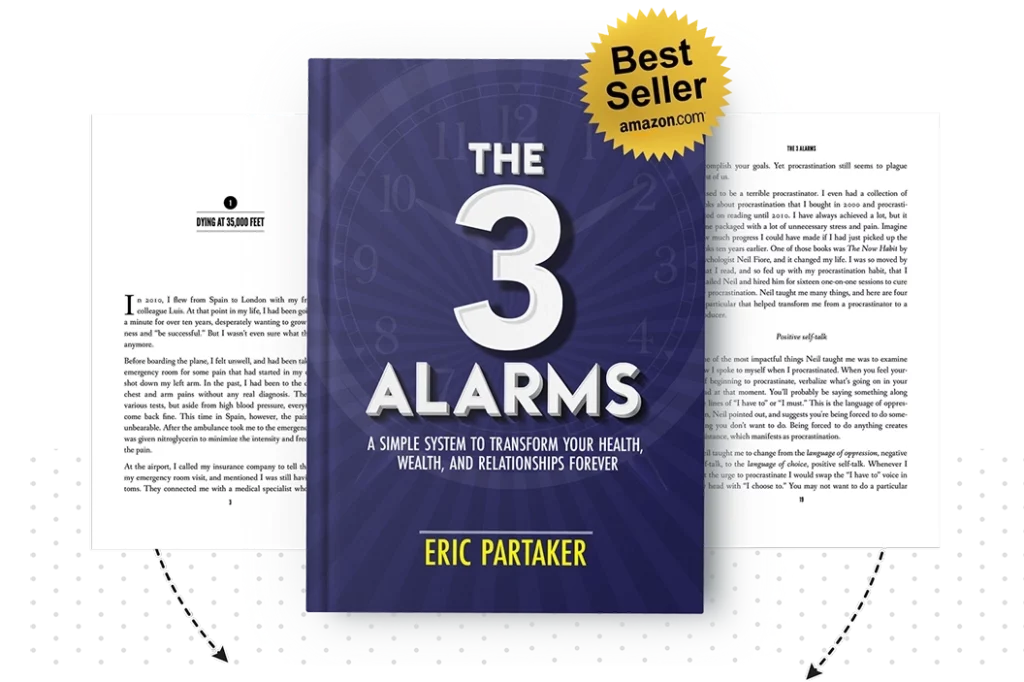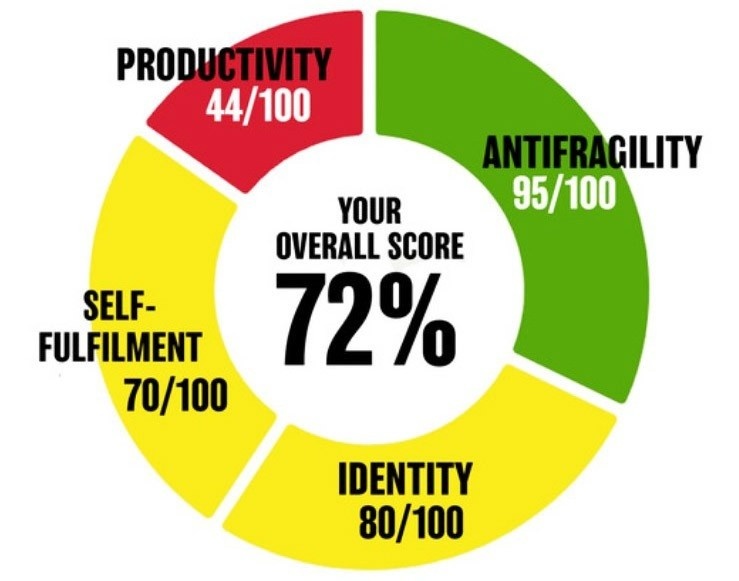How To Be Fearless Under Pressure // The powerful feelings of fear, panic and stress can be overwhelming if we do not control them. Harnessing fearlessness and finding your best self under pressure is a skill that can be learned and today is the day to sweep fear to the side and stop holding yourself back. In this video, peak performance coach and expert Eric Partaker will show how you can be calm under pressure, perform at your best and become mentally strong so you can pursue your dreams without fear stopping you.
KEY POINTS
Take A Step Back – What’s causing your panic and stress? Find the root of the cause. Understanding the situation will allow you to reduce the fear when you’re under pressure. You’ll be able to get a better idea of what’s driving the situation and therefore how to correct it.
Knowledge Is Power – Schedule into your calendar time for knowledge and skill development. Identify the skills you need to work on in order to relieve the pressure in your stressful situations. The greater your knowledge and skills the more confidence you will have.
Get Comfortable Being Uncomfortable – Your growth and future potential sits outside of your comfort zone. You need to step outside of it to grow. Nothing great in life is achieved by staying comfortable. Embrace stress, reframe it as something that is going to benefit you.
Change Your Words, Change Your Mindset – When stressed, and the feeling of nerves creeps up on you. Reframe your mind, Instead of sitting there saying “I’m nervous” say “I’m excited!” The energy that you feel, when nervous or anxious is chemically very similar to the feelings within your body when excited.
Relive The Past – Remind yourself of times when you experienced an equally challenging situation, and remember how you were able to get through it.
TRANSCRIPT
We can all relate to feelings of panic, dread and stress, but they do not control you. We can all become masters at performing well under pressure. And today I’m going to share with you exactly how you can do that.
Hi, my name is Eric Partaker, and I’ve been recognized as the CEO of the year. And I’m also the author of two best-selling books, including The 3 Alarms.
How do we become fearless under pressure?
Well, number one, we need to understand the situation. So what is going on? You need to step back. What’s generating the fear? What’s generating the pressure? What’s the root cause of that? If you’re afraid to do something, ask yourself why, “Why am I afraid?” And then you might arrive at the next thing which is, “Well, because I don’t have knowledge in a particular area.”
“Well, why don’t I have knowledge in a particular area?”
“Because I haven’t scheduled the time in my calendar to learn about that thing.”
“Why haven’t I scheduled the time in my calendar?”
“Because I’m over committing myself in other areas that aren’t as important as where I should be spending my time.”
And by continually going deeper and deeper and deeper and asking why, and really understanding the situation, understanding what’s creating the pressure, what’s creating the fear, will allow you to become more fearless under pressure, because you’ll be getting a better idea of what’s driving the situation and how do you correct it? How do you ultimately fix it? How do you put your time and focus in the right place?
Number two, you have to build knowledge and skills so that you believe in your ability. Now, there’s a caveat with this. You can’t sit there in the classroom forever, year after year, decade after decade, thinking that eventually someday I’ll have the knowledge and skill to go ahead and take that leap. You need to leap. And the net will appear at some point, but of course you do need it a base level of skill. You wouldn’t recommend to somebody for example, to go ahead and ride your bike for the first time across a busy motorway. You want to understand at least the basics. But once you understand the basics, realize that a lot of your skill development thereafter will come from doing whatever it is that you’re trying to learn to do. So you need to identify what are the skills that I need to learn that will help relieve the pressure in this situation, that will help relieve the fear when it comes to the particular activity that you’re trying to work on or get better at?
And then you need to make sure that the time to work on that skill development is programmed in your calendar. If you want to get better at something, I should be able to sit down next to you, open up your calendar and see where in your days and weeks ahead, have you scheduled the skill development that’s necessary to take you to the level that you want to be, or at least to give you that baseline of ability that allows you to go ahead and leap and start getting the game. Knowing full well, though, that when you do make that leap, you still won’t feel confident. You will still be a little bit fearful and uncomfortable.
And that is a perfect segue to the next point, which is being comfortable being uncomfortable. You need that baseline of skill, that very beginning point, but then you need to just get out there and step into it. You need to step into the discomfort. All of your growth, all of your future potential, it’s not within your comfort zone. You need to step outside of it. That’s where your growth is. Nothing great in life is achieved by just staying comfortable. If you want to stay comfortable, stay in the sofa, watch Netflix or films or whatever. That’s comfortable. You won’t really get anywhere. But if you want to really achieve more than that, and if you want to become fearless under pressure, then you really have to get good at being comfortable being uncomfortable. Embrace it, embrace the stress, reframe it as something good for you.
I’ll give you a quick little example here. If you take three groups of people, one that lives a completely stress-free life. The second group that views stress positive and has quite a lot of it in their life. And the third group that view stress negatively and has quite a lot of it in their life. It’s the second group that lives the longest. The group that views stress positively, even though they have a lot of it in their life, actually outlives the first group that lives a stress-free life. Why is that? Well, if one person goes to the gym and stresses their muscles, they become stronger. If another person never exercises in their life, eventually they become weaker. So we have to become comfortable stepping into discomfort, become comfortable being uncomfortable because it’s our path to becoming stronger and it’s part and parcel of becoming fearless under pressure.
Number four, we need to establish a pre-performance routine. A lot of times when we’re in pressure situations, we will wrongly, for example, try to eliminate those nerves completely. We might say, “Just be calm. Everything’s going to be okay. Everything’s going to be fine.” Instead, go with the energy. And instead, transform the energy. Instead of sitting there and saying, “I’m nervous.” Say, “I’m excited.” Because I’ll give you a quick tip here. Biologically speaking, the energy that you feel, that nervousness and that anxiety when you’re in a pressure situation is actually chemically similar to the same feelings and the same things going on in your body when you’re excited. So rather than try to eliminate those feelings, go with them, but relabel them. And you can do that as part of a pre-performance routine.
So before you get out there and speak in front of a group of people or try something that you haven’t done, and when you feel those nervous feelings, when you feel that anxiety, relabel it. Don’t try to change it. Instead of saying mentally, “I’m nervous. I’m scared.” Say, “I’m excited. I’m thrilled.” Go with the energy, give it a different name and install that as part of a pre-performance routine to get your mind in the right place before you’re going into pressure situations.
Next step is remember back to similar situations. If you have a high-pressure situation coming up, remember back to similar situations. They do not need to be identical, but remember back to when you went through equally challenging situations, maybe in a different shape or form, and see how you were able to get through that. See how it wasn’t as bad as you thought it was going to be at the time and how you still managed it despite it being hard. It doesn’t need to be pain free, again, you need to be comfortable being uncomfortable. But it’s more about remembering that, hey, I’ve gone through this type of pressure before, maybe in a different again, shape and form and in a different circumstance, but I’ve gone through it before and I can go through it again.
And if you can’t find something in your own personal history, look around you in the history of others. Ask friends or colleagues or family members, how they responded in similar situations. Tap into their story, into their power, and understand how they were able to survive under pressure and still remain fearless and still do the things that they were seeking to achieve.
Last but not least, to remain fearless under pressure, you need to harness the power of the pause so that you do not become ruled by your emotion. So what is the pause and how do we harness the power of it?
Well, you’ll have a trigger event. Something that is going to really strike a lot of fear maybe within you and it creates obviously this pressure situation. Well, we need to recognize that there’s actually a bit of space between our response to whatever that is. And of course, if there is a life or death situation, you don’t have maybe time to create space. You need to kind of react on instinct, but I’m not talking about those situations. I’m talking about the situations that create a lot of unnecessary fear and pressure in us that we could better manage if we employ some of the techniques that we’re discussing today. And one of those once again is using the pause. So you take the stimulus, whatever the trigger event is, and then you simply pause. Take a deep breath, go for a walk, have some time thinking about how you want to respond, but don’t respond right away. Because when you respond right away, often that response will be a suboptimal response, a response that’s not consistent with the very best version of you.
And if you pause, you afford yourself the chance to tap into that timeless wisdom within with the simple question, “How would the most courageous version of me respond to this situation right now?” Because there is a response… No matter what the pressure situation, no matter what the fearful situation is, there is a response within you that would be consistent with the most courageous version of you. And then there are all the other responses that you could give or do. And by using the art of the pause, by taking a moment to think through, how would that version of you respond before you respond, you’re more likely to respond in a way consistent with the best in you, rather than something less in you.
I’d love to hear from you. So don’t forget to leave a comment and a rating as well. And if you’d like to get a copy of my new book, The 3 Alarms, please head over to my website at ericpartaker.com. That’s E-R-I-C, ericpartaker.com, where you can pick up a free digital copy of my new best-selling book The 3 of Alarms.




